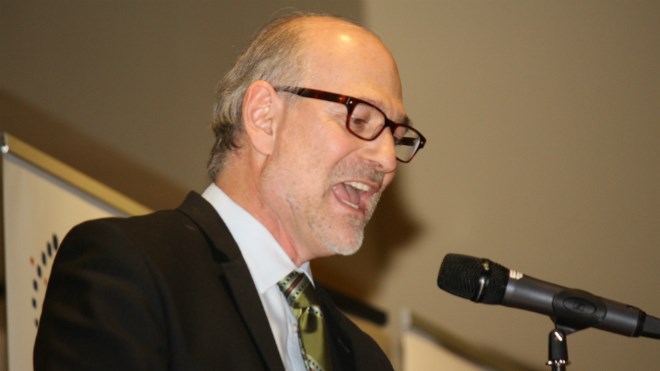We all die, but most of us don’t acknowledge this universal fact until it’s too late, said Dr. Harvey Chochinov, professor of psychiatry at the University of Manitoba and director of the Manitoba Palliative Care Research Unit.
Chochinov told this to a packed room at an end-of-life public forum at the Steelworkers Hall Thursday night.
“If you have a pulse, one day you won’t,” Chochinov told the crowd matter-of-factly.
Accepting one’s death, and planning for it, can make all the difference in a person’s final days, months or years, Chochinov said.
That planning can be as simple as conversations with loved ones about your final wishes, and how you wish to die. “Sometimes we’re so frightened of these things that we’re afraid to even put it into words,” Chochinov said.
Because those conversations often don’t happen, it is estimated that only 15 to 30 per cent of Canadians won’t have access to palliative care.
Reasons for that lack of access go beyond a lack of planning, but advanced discussions can make all the difference in making sure a loved one has the very best care possible near the end of their life, Chochinov said.
Physicians and hospital staff can also have a great impact on a patient's end-of-life care, simply by how they approach their work, Chochinov said.
In his studies, he found that dignity, and maintaining a well-developed sense of self, impacted a patient's will to live.
Chochinov said doctors and other health care workers need to approach their patients with empathy and listen to their final wishes. Medicine is more than the technical and scientific expertise a doctor requires, he said.
Dr. Brian Goldman, an emergency doctor at Mount Sinai Hospital in Toronto, and host of the CBC Radio show "White Coat, Black Art," also spoke at the forum, and said our society needs to accept that death is a part of life.
“End-of-life care is labour-intensive and I’m not sure the country is putting sufficient resources into it,” Goldman said.
He said Canada needs more hospices and geriatricians.
Goldman said people in the medical profession often look down on geriatrics. To illustrate that point, he played a clip from his radio show in which he spoke with young physicians who have chosen to be geriatricians. They all said their peers have questioned their decision to enter that field.
Goldman agreed with Chochinov that there is a need for more empathy in medicine. He cited examples from his experience as an emergency room doctor, in which he has seen doctors use acronyms, such as 'FTD' – which stands for “failure to die” – that he said were in poor taste and displayed a lack of compassion for the patients.
Join Sudbury.com+
- Messages
- Post a Listing
- Your Listings
- Your Profile
- Your Subscriptions
- Your Likes
- Your Business
- Support Local News
- Payment History
Sudbury.com+ members
Already a +member?
Not a +member?
Sign up for a Sudbury.com+ account for instant access to upcoming contests, local offers, auctions and so much more.
